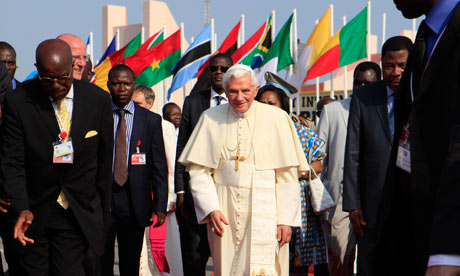
When Pope Benedict XVI departed Benin on Sunday after a three-day visit, he left behind Africae Munus (The Commitment of Africa), a 130-page pastoral guide. Written in the first-person from, presumably, the pope's perspective, the Africae Munus details a vision for both the practical and prayerful parts of life on the continent that is home to the fastest-growing number of Catholic congregations in the world. The apostolic document reveals a healthy respect for a certain amount of difference, including indigenous religions, Islam and Protestantism. It calls for the abolition of the death penalty, condemns violence against women and, importantly, points to the plague of political corruption in much of the continent's governments.
But it is remarkable that the pope persists in prescribing a response to Aids in Africa that makes no mention of contraception. This is so even after he was criticised in 2009 for saying, en route to his first visit to Africa, that condoms "increase the problem" of Aids. The backlash to this dangerous assertion may have prompted him to reconsider; one year ago, he allowed that, for male prostitutes, condoms are the lesser of two evils – a specific case that implied homosexual sex and thereby wouldn't prevent conception. The Vatican spokesman said that condom use by people with HIV might be "the first step of responsibility, of taking into consideration the risk to the life of the person with whom there are relations". Official church teaching remains unchanged in its fierce opposition to contraception: a book released by the pope last year calls condoms "not a real or moral solution". But it nonetheless seemed that the church was beginning a slow path toward acknowledging reasonable methods of preventing a devastating disease.
An estimated 22.5 million people live with HIV in sub-Saharan Africa, or about two-thirds of the global total of sufferers. Here is what the pope says about such a knee-shaking reality, in part three of chapter two of his guide (The African vision of life):
"The problem of Aids, in particular, clearly calls for a medical and pharmaceutical response. This is not enough, however: the problem goes deeper. Above all, it is an ethical problem. The change of behaviour that it requires – for example, sexual abstinence, rejection of sexual promiscuity, fidelity within marriage – ultimately involves the question of integral development, which demands a global approach and a global response from the Church. For if it is to be effective, the prevention of Aids must be based on a sex education that is itself grounded in an anthropology anchored in the natural law and enlightened by the word of God and the Church's teaching."
The pope notes support for church members working in healthcare, "especially with regard to Aids". He exhorts international agencies to assist them, "respecting your specific character", and encourages research aimed at eradicating pandemics like Aids. "The Church, indeed, has been pleading for a long time for high quality medical treatment to be made available at minimum cost to all concerned."
And therewith is the sum total for the Africae Munus's discussion of Aids.
Certainly the pope's support for Aids-related research and treatment is meaningful. But he continues to sidestep one of the most effective and low-cost preventive healthcare treatments available: barrier contraceptive methods, especially male condoms and female condoms.
While the pope acknowledges a few different necessary actions regarding Aids, he highlights the personal ethics of "behaviour" by naming abstinence, fidelity and the rejection of promiscuity as particularly necessary changes. He chooses not to be so specific about contraceptive use, which is up to 97% effective in prevention.
Some Catholic leaders in Africa acknowledge the dissonance of a church that desires the end of Aids and a church that hedges or omits support for contraceptive use. Cardinal Peter Turkson of Ghana has encouraged priests to counsel married couples when one partner is HIV positive. Bishop Kevin Dowling of South Africa maintained that African people "must use condoms". Despite official teaching, Dowling contends that protecting life is more important than permitting pregnancy.
We are 30 years past the first appearance of Aids. This not an ideological conversation anymore. Lives are at stake.

